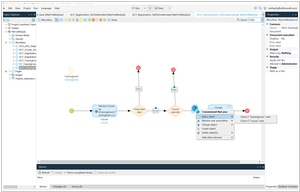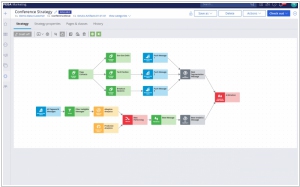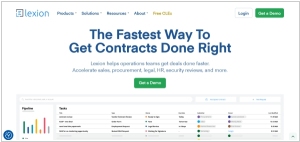Mendix vs Pega
July 27, 2023 | Author: Michael Stromann
Mendix and Pega are both prominent low-code development platforms, but they have some fundamental differences in terms of their focus and capabilities. Mendix is a highly versatile low-code platform that emphasizes ease of use and rapid application development. It empowers a wide range of users, including business analysts and citizen developers, to create custom applications without extensive coding knowledge. Mendix's visual development approach enables seamless collaboration between technical and non-technical stakeholders, making it an ideal choice for organizations seeking to innovate and digitalize their processes quickly. The platform is suitable for building a variety of applications, from simple prototypes to complex enterprise solutions.
On the other hand, Pega is known for its robust business process management (BPM) and customer relationship management (CRM) capabilities. It is a platform that focuses on optimizing and automating business processes and workflows, as well as providing advanced customer engagement tools. Pega excels in orchestrating complex processes and managing customer interactions across various channels. It is often used by larger enterprises and organizations in industries with intricate processes and extensive customer engagement requirements. Pega's strength lies in its ability to handle sophisticated workflows and deliver personalized experiences to customers, making it suitable for businesses looking to streamline their operations and enhance customer satisfaction.
Another significant difference between Mendix and Pega is their target market and pricing models. Mendix is generally more accessible to smaller and mid-sized businesses, with a pricing model that allows users to start at a lower cost and scale as their needs grow. Pega, on the other hand, is often considered a more enterprise-level solution, which may come with a higher price point. This pricing difference reflects the respective platforms' capabilities and the types of organizations they cater to.
See also: Top 10 Low-Code Platforms
On the other hand, Pega is known for its robust business process management (BPM) and customer relationship management (CRM) capabilities. It is a platform that focuses on optimizing and automating business processes and workflows, as well as providing advanced customer engagement tools. Pega excels in orchestrating complex processes and managing customer interactions across various channels. It is often used by larger enterprises and organizations in industries with intricate processes and extensive customer engagement requirements. Pega's strength lies in its ability to handle sophisticated workflows and deliver personalized experiences to customers, making it suitable for businesses looking to streamline their operations and enhance customer satisfaction.
Another significant difference between Mendix and Pega is their target market and pricing models. Mendix is generally more accessible to smaller and mid-sized businesses, with a pricing model that allows users to start at a lower cost and scale as their needs grow. Pega, on the other hand, is often considered a more enterprise-level solution, which may come with a higher price point. This pricing difference reflects the respective platforms' capabilities and the types of organizations they cater to.
See also: Top 10 Low-Code Platforms




